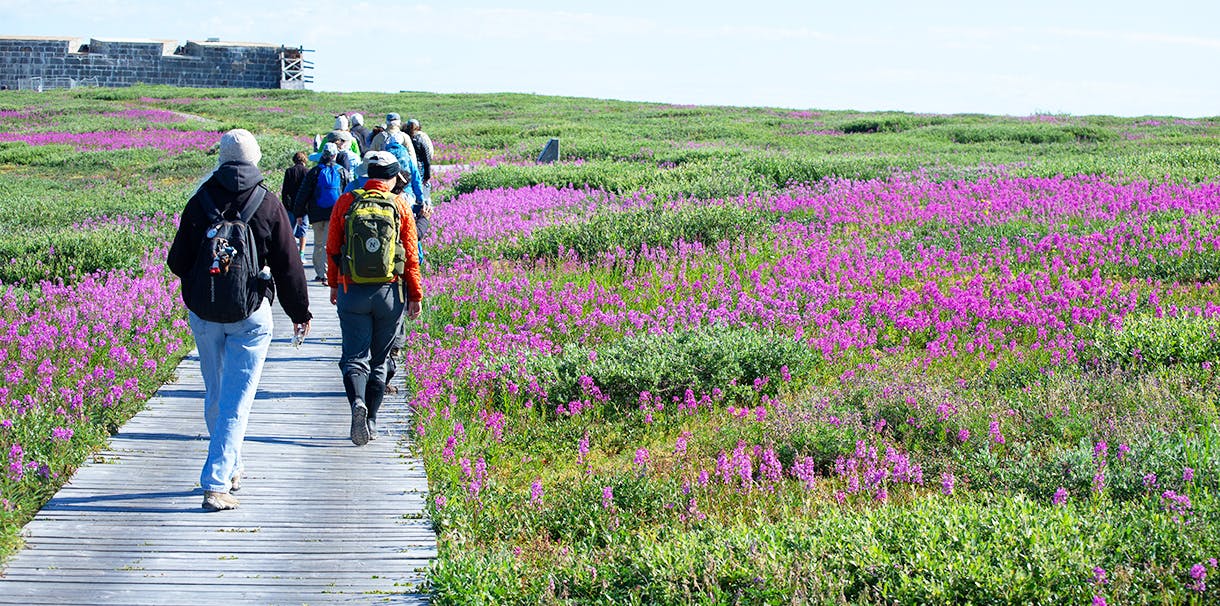Acknowledging the Land
As a Red River Metis person and landscape designer, I, Jordan Cantafio, deeply acknowledge my connection to the land and all its living beings. Bridging these identities, I am dedicated to giving the land a voice, helping us to transform or restore our relationship with it so that both the land and all living beings can thrive in life and health.
As we approach Canada Day, it's crucial to reflect on the deeper truths that this celebration often overlooks. When we speak of "truth," we must face uncomfortable realities. One such truth is the history of the land on which we stand and Canada as a nation.

Land acknowledgements have become an easy checkmark on the list of reconciliation efforts. But how often do we truly reflect on and recognize the Indigenous territories we inhabit? How often do we genuinely consider and acknowledge the local land and its insects, trees, and animals as living beings sharing the same land? We must recognize the Indigenous territories we occupy, lands acquired through treaties often marked by coercion and deceit. Unlike the western concept of land ownership and land as a commodity assigned with capital value to be utilized within the capitalist framework, many Indigenous cultures view land as a shared gift meant to be respected and cared for collectively. This land provides us with numerous gifts, sustaining us both locally and globally. By acknowledging this, we honour not just the land itself but also the attention to care, connection, and relationship Indigenous peoples have always had with it.
Truth and Acknowledgement
Canada Day traditionally celebrates the founding of a nation, one that many identify with. This celebration often ignores the violent colonial systems designed to extinguish Indigenous peoples and cultures. The creation of Canada was not just a geopolitical event; it was a series of many deliberate acts and implemented systems to colonize and control both people and land. It is important for those who identify as Canadian to acknowledge these often redacted truths in understanding their national identity. Here on Treaty 1 land, Winnipeg was once home to a blend of lush riparian forests and upland tall grass prairies. These landscapes were cleared for agriculture and marked by artificial drainage paths across the Red River Valley. The urban center was established on significant floodplain, disregarding its historical use as a seasonal gathering place for Indigenous peoples. The construction of the floodway further altered the land to support permanent settlement. Therefore, Canada Day also celebrates the colonization of land, an act that has and will continue to have long-lasting environmental, cultural, social, and political repercussions.
Trauma to Land
The trauma inflicted by colonization extends beyond the Indigenous peoples it sought to eliminate or assimilate; it also deeply scarred the land. The environment suffered immensely from deforestation, the damming of rivers, mining activities, resource extraction, and industrial pollution. Acknowledge the beauty of those that have not been subjected to such traumas. These actions have left long lasting damage on ecosystems that once thrived under Indigenous stewardship and before.
The Continuation
Modern society continues these colonial practices, driven by a capitalist agenda that prioritizes profit over the collective wellbeing of people and the environment. This approach is unsustainable and disregards the health of our planet and its inhabitants. We recognize that these practices are a continuation of the same colonial systems and mindset that led to the formation of Canada.
A Call to Reflect
Instead of a celebration, Canada Day should be a time for reflection on the traumas inflicted on the original peoples and lands of Turtle Island. Our failure to acknowledge the land and its gifts perpetuates a cycle of colonization, commodifying the land rather than recognizing it as a living entity that provides life and health. Reflect on how fortunate we all are to have the existing and remaining land, waters and other living organisms – acknowledge their presence and give thanks to them. By understanding these truths and reflecting on them, we can begin to mend and build a future that honours and cares for the land as it once was by its original peoples. We urge you to recognize the land's true value beyond its economic worth.
The following are some reflections you may consider:
- Reflect on your positions and benefits sown from the colonization of land and the original peoples to it.
- Reflect on the dis-privileges experienced by the land and peoples that have occurred because of colonization.
- What treaty are you located on? What is its history?
- What are the local original nations and tribes the land your home is built on? Where is your drinking water sourced? How much drinking water are you using unnecessarily?
- Where is your electricity sourced?
- What ecology formerly existed where you live? What are some local at risk or endangered species where you live that have arisen because of development of where you live? How can you help to give back to them?
- Check your excesses – we are all guilty of them. How could we not be? Society teaches us that excess is the definition of success. As a sign of respect, don't take more than you need for the day and make it a practice to curb excess. Reflect on where your excesses come from.
A New Perspective
Celebrating Canada Day without acknowledging these truths implicitly endorses the injustices upon which the nation was built. Canadian identity, for many, is intertwined with these histories of colonization, genocide, and environmental destruction. Yet, this identity can evolve. As part of reconciliation – that is, the acknowledgement of these truths, action to them, and the commitment to a better future not separately but together – we must also reconcile the traumas imposed on the living land through colonization. Let us shift from celebration to acknowledgment, from ignorance to understanding, and from exploitation to respect.




